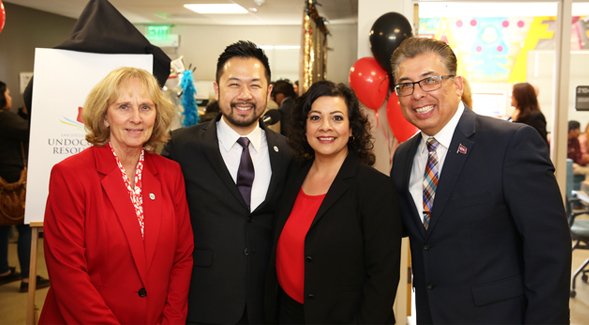SDSU Formally Opens Undocumented Resource Area
SDSU President Sally Roush said the new area celebrates our universitys tradition to welcome and support all students, faculty and staffregardless of immigration status.

“We are deeply committed to student success, no matter where a student’s journey begins, and no matter their immigration status.”
San Diego State University has formally opened the Undocumented Resource Area as part of its mission and commitment to support the academic success of its students, regardless of their backgrounds and experiences.
Housed within the Office of Educational Opportunity Programs and Ethnic Affairs (EOP), the Undocumented Resource Area (URA) provides a safe and welcoming space for all undocumented students at SDSU, including those from mixed-status families.
“This new Undocumented Resource Area is the right thing to do for our undocumented community and for our university,” SDSU President Sally Roush said, addressing about 150 people who attended the URA’s grand opening ceremony on May 2.
“Our undocumented students are high-achievers. They excel in the classroom, do research and earn fellowships. They also lead student groups and volunteer in the community,” said Roush, receiving applause from the full room, which included SDSU administrative and student leaders, alumni, elected officials, families and supporters. “They make SDSU a better place and increase the value of an SDSU degree for everyone. An SDSU education will help these high-achievers contribute to solving society’s challenges.”
The URA provides a centralized space to offer tailored support to undocumented students, whose unique challenges may be related to finances and feelings of isolation, said Miriam C. Castañón, the EOP director.
Given the experiences that undocumented students have faced and continue to face, the URA was strategically designed to sit within EOP to provide students with easy and regular access to existing wrap-around services, Castañón said. “The URA has been intentionally developed to improve persistence and graduation as well as offer a safe and loving space where students can connect with one another and their allies.”
EOP staff work in collaboration with campus and community partners to offer academic support, career advising and, when needed, referral to off-campus community service providers—all resources known to help improve student retention, persistence and graduation.
“We are deeply committed to student success, no matter where a student’s journey begins, and no matter their immigration status,” SDSU Vice President for Student Affairs Eric Rivera said. “The Undocumented Resource Area aligns directly with SDSU’s mission to provide resources so that our students feel welcome, valued, sense of belonging and are well-supported in achieving their goals.”
EOP has also partnered with Associated Students to provide funding for Deferred Action for Childhood Arrivals (DACA) renewal applications, which represents another example of the ever-growing support for undocumented students at SDSU, said Cynthia Torres, the Undocumented Resource Area coordinator.
“I have seen this university go through such transformation,” said Torres, a two-time SDSU alumna. “And our students have become united, strong and supportive of each other as they have come out of the shadows, and as they are attaining the kind of social mobility that allows them to open doors for themselves.”
Gloria Cruz, an SDSU alumna who was an undocumented student, was among the early students to use the AB 540 waiver—also known as the California Dream Act—in San Diego after it became effective in January 2013. The act allows undocumented students who have attended a California high school for at least three years and earned a high school diploma (or its equivalent) to be exempt from paying non-resident tuition at California public universities and be eligible for state-funded financial aid.
“I wouldn’t have imagined anything like this was ever possible,” said Cruz, who founded Education Without Borders while at SDSU and now serves as a policy advisor to San Diego councilmember Georgette Gómez. “Today we are celebrating the opening of a physical space that will serve generations to come.”
For information about the SDSU Undocumented Resource Area, call 619-594-6298.
Media contact: La Monica Everett-Haynes ([email protected])



